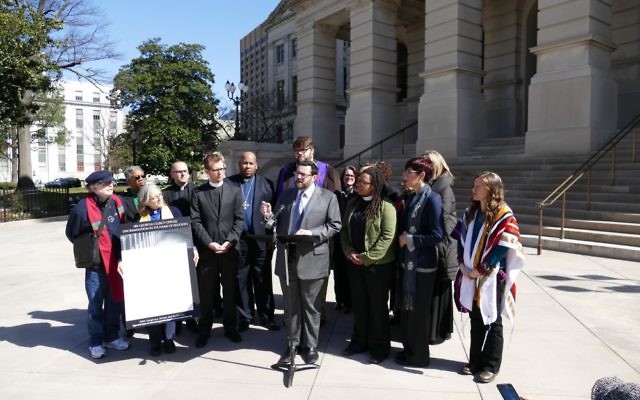Rabbis Help Battle Hybrid Religious Liberty Bill
Above: Religious leaders from all over Atlanta, including Congregation B’nai Torah Rabbi Joshua Heller, gather on the front steps of the Georgia Capitol on Feb. 17 to protest the merging of two religious liberty bills.
A group of religious leaders from across Atlanta joined together Wednesday, Feb. 17, at the Georgia Capitol to push back against legislation merging two religious liberty bills.
The new bill, which folds Senate Bill 284, the First Amendment Defense Act, into House Bill 757, the Pastor Protection Act, has advanced further than any of the six other religious liberty bills active in the General Assembly’s 2016 session.

On Feb. 16, the Georgia Senate Rules Committee approved the hybrid bill, derided by critics as a “frankenbill,” and sent it to the full Senate with a recommendation for passage.
“This is a discrimination act cloaked in the veil of freedom,” said the Rev. Kimberly S. Jackson of the Absalom Jones Episcopal Center in Atlanta. “It is an affront to our religious beliefs.”
Three rabbis descended on the front steps of the Capitol to join the fight against the bill: Rabbi Malka Packer of InterfaithFamily/Atlanta, Rabbi Pamela Gottfried of the Weber School and Rabbi Joshua Heller of Congregation B’nai Torah. The trio told the AJT that more rabbis would have attended, but the press conference was arranged on short notice by Faith in Public Life in response to Tuesday afternoon’s creation of the combined bill.
Rabbi Heller, who was the final speaker at the press conference, said he gave up tickets to the Atlanta Jewish Film Festival‘s day of encores to attend the event.
“I’m actually a little troubled that good people of faith are supporting this bill,” Rabbi Heller told the small crowd at the Capitol. “The Bible says to uplift the downtrodden, and it doesn’t matter if they are Christian, Jewish, American, you name it. The Bible says to feed the hungry; it doesn’t matter if they are straight or if they are gay. The Bible says to heal the sick; it doesn’t matter who they are married to. The Bible says to care for the stranger, not to push them away. So I would ask that every person of faith in Georgia say about this bill: Not in my name, not in our name, not in G-d’s name.”
H.B. 757 in its unamended form unanimously passed the House on Thursday, Feb. 11. The legislation is a response to the Supreme Court’s legalization of same-sex marriage in June. It would protect any member of the clergy from being forced to officiate at a wedding or other religious rite in violation of his or her religious beliefs.
The Anti-Defamation League, among other critics, has said such pastor protection is unnecessary because the First Amendment already “guarantees the right of clergy to marry who they want.”
ADL Southeast Regional Director Mark Moskowitz issued a statement Feb. 17 condemning the amended bill.
“It is disgraceful that in the year 2016 the Georgia legislature is thinking of turning the clock back 50 years,” Moskowitz said. “This bill leads the state in the wrong direction and sends a bad message about Georgia to the rest of the country.”
The amended legislation sent to the Senate floor contains language that could be problematic for Jews and Jewish organizations. A Sabbath section protects employees from being forced to work and businesses from being forced to operate on “either of the two rest days (Saturday or Sunday),” thus ignoring that Shabbat starts on Friday evening. And a “religious organization” is defined in the bill strictly in church terms.

Part 2 of the legislation, the former S.B. 284, seemed to be the focus of most criticism during and after the Rules Committee hearing. The legislation aims to protect from government action any people and faith-based organizations speaking or acting on a “sincerely held religious belief” that marriage should be between a man and a woman or that sex should occur only between such married couples.
The bill thus offers protection not only to businesses that deny service to same-sex couples, but also, for example, to those that refuse to hire unwed mothers.
“FADA opens the door to state-sanctioned discrimination against single mothers, unwed parents, people of other faiths and more — all under the guise of so-called ‘religious freedom,’ ” Georgia Unites Against Discrimination Executive Director Jeff Graham, who testified against the legislation, wrote in an email blast after the committee passage.
SOJOURN Education Director Robbie Medwed, who also testified against the bill, said it would enable faith-based organizations to go into public schools and preach against LGBT students, raising the risk of suicide.
After Wednesday’s press conference, Rabbis Pamela Gottfried and Malka Packer explained their objections to the bill.
“This is an issue of great importance to me not only as a rabbi, but as a parent,” Rabbi Gottfried said. “Any bill that tries to discriminate against anyone is anti-faith, anti-Jewish, and it’s not part of my religious freedom. My religion teaches that we treat all people equally, and that’s what we want to let the legislators know. This is not the religious freedom that I was taught.”
Added Rabbi Packer: “As a rabbi, as a queer rabbi and as a rabbi newly in Atlanta, for me all the work that I do is all about radical inclusion on every level. This bill does not support that.”




comments